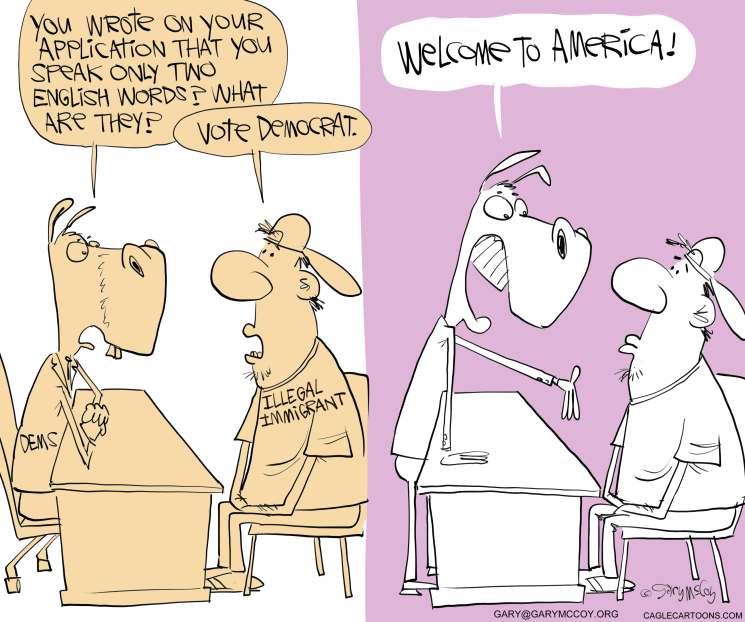
Ryan’s Parting Betrayal: Biggest Amnesty in U.S. History
Amnesty spawns illegal immigration, a talking point enforcement advocates repeatedly make. Because the math conclusively proves that amnesty leads to more illegal immigration, the pro-amnesty contingent rarely counters. Here are the statistics: In 1986, when President Ronald Reagan signed the Immigration Reform and Control Act (IRCA), 2.7 million people were amnestied, including those covered as part of Special Agricultural Worker provisions.
Today, the estimated illegal immigrant population is 11 to 12 million, curiously, the same popularly cited statistic for roughly the last 20 years. To be sure, not every illegal immigrant that resided in the U.S. in 1986 applied. Still, it s safe to assume that the illegal immigrant population has increased by at least five million during the last three decades.
The major reason that illegal immigration grew is that Congress never delivered on its promise to implement interior enforcement and to crack down on employers who hired workers present illegally. And despite widespread congressional insistence back in 1986 that IRCA would be the last amnesty, six others have passed since then, including the 2000 Late Amnesty for 400,000 illegal immigrants who claimed that, for various reasons, they couldn t participate in IRCA.
Having learned nothing from IRCA s fallout – that amnesty encourages illegal immigration and that chain migration from previous amnesties continues today – the U.S. House of Representatives is poised to vote on two legalization bills this week, one dramatically better than the other, but neither perfect.
House Judiciary Committee Chair Robert Goodlatte introduced his bill which would codify deferred action for childhood arrivals, end the visa lottery, cancel some chain migration categories, and provide full funding for a border wall. Also, parents of U.S. citizens could only relocate on nonimmigrant visas that would not lead to citizenship, and with evidence of pre-paid health insurance. A downside to Goodlatte s proposal is that it transfers the 55,000 lottery visas to employment-based categories, already bulging at the seams.
But the most important takeaway from Goodlatte s bill is that it would require mandatory E-Verify which would eliminate the jobs magnet that lures a large percentage of employment-seeking illegal immigrants. Congress has consistently blocked E-Verify since 1996 when it was established as the Basic Pilot Program as part of the Illegal Immigration Reform and Immigrant Responsibility Act.
The second bill which the establishment GOP covets is the odds-on-favorite to pass. A leaked draft version indicates that Goodlatte s E-Verify provision would be stripped, chain migration and the visa lottery left intact, and the status quo maintained for citizens parents.
Worse, the House Speaker-led Paul Ryan establishment version would dramatically increase legal immigration. In a shameless and brazen cave-in to the tech lobby and to immigration expansionists, Ryan s version would end the per-country visa cap which means more South Asians would dominate the H-1–visa category, would amnesty long-term foreign tech workers children that currently hold temporary visas, and might grant legal status not only to DACA recipients but also to their parents.
The retiring Ryan s going-away present to immigration-weary Americans eventually could be the biggest amnesty in U.S. history and could include the 3.5 million DACA-enrolled and DACA-eligible residents, and an untold number of border-surgers who might somehow qualify, an estimated additional one million.
Congress is rushing toward an amnesty vote without committee hearings as if it were the most important item on America s agenda. The reverse is true. Four of five Americans want less immigration, according to a recent Harvard-Harris poll.
More math: Goodlatte will fail because it won t get a single Democrat s vote, and Ryan will likely win because pro-amnesty Republicans will join the Democrats to push it over the top. The variable remains President Trump and his veto power. Last week, on a single day and within a span of just a few hours Trump was reported to have rejected, and then said to have supported Ryan s version.
With the president, one never knows.
–
Joe Guzzardi is a Progressives for Immigration Reform analyst who has written about immigration for more than 30 years. Contact him at [email protected].

Leave a Reply